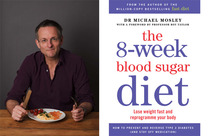UPDATE: Catch up on our webchat with Dr Michael Mosley further down on the thread.
Join Dr Michael Mosley on Thursday 10 March 1-2pm, when he'll be answering your questions on his new book The 8 Week Blood Sugar Diet. With an estimated weight loss of 14kg in 8 weeks, the book is suitable both for those at risk of raised blood sugar levels, and those who simply want to lose some weight - and keep it off. Add your questions below and don't forget to join us on 10 March for the answers.
Dr Michael Mosley, author of the bestselling 5:2 Fast Diet, reveals a game-changing approach to one of the greatest silent epidemics of our time - raised blood sugar levels.
The food we eat today, high in sugar and easily digestible carbohydrates, is not only making us fat, but is putting us at risk of type 2 diabetes, strokes, dementia, cancer and a lifetime on medication. More than a third of adults in the UK now have raised blood sugar levels and most don’t know it.
In this timely book, Dr Mosley explains why we pile on dangerous abdominal fat and shows us how to shed it, fast. He demolishes common myths, such as the claim that steady weight loss is always better than rapid weight loss and that those who lose weight rapidly will inevitably put it back on.
Buy your copy of The 8 Week Blood Sugar Diet on Amazon.




